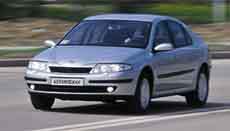Test drive by Renault Laguna 2001 - 2005 hatchback
Samples for photogenicity
Two original in full -time dispute
Renault Laguna II debuted in the fall of 2000 (the Russian presentation took place only in the spring of the current one). It is produced with two types of body: hatchback and station wagon with a whole family of engines - gasoline from 1.6 (107 hp) to 3.0 liters (207 hp) and turbodiesel - 1.9 and 2.2 liters ( 100-150 hp) respectively. The latter are aggregated with a six -speed manual gearbox. Gasoline versions are equipped with either five -speed mechanics or a four -speed automatic.
Nissan premer. The European presentation took place in Frankfurt in 2001. It is offered with three bodies: sedan, hatchback and station wagon. Gamma of gasoline engines from 1.6 to 2.5 l with a capacity of 109 to 204 hp. There is also a turbodiesel - 2.2 liters, 126 hp Depending on the engine, five- or six-speed mechanics, automatic or variator can be installed.
Since passenger cars have stopped drawing by hand and computers have taken up the case, discussions about the convergence of forms and styles have become more than relevant. Obviously, cars (at least one class) are made more and more similar, rapidly adopting the latest achievements of design and technical thought in competitors. But the consumer wants not only technical perfection, but also individuality, unusualness. In the market segment D (middle class), as a rule, classic forms dominate. They meet the stereotype of a solid and convenient car, whose appearance is not prone to revolutionary transformations, and the status of the owner is determined by the emblem on the radiator grille. However, there are exceptions to the rules. With two such reformers we have to meet in this test.
Features of style
 The Russian presentation of the hatchback Lagun II was under the sign of the outstanding achievements of the French in the field of passive security. Having withstood the EURONCAP Crash tests with the highest rating of 5 stars, the lagoon is declared the safest car in its class.
The Russian presentation of the hatchback Lagun II was under the sign of the outstanding achievements of the French in the field of passive security. Having withstood the EURONCAP Crash tests with the highest rating of 5 stars, the lagoon is declared the safest car in its class. However, this is only one of the consumer success components. Indeed, for him, the car is primarily style, appearance, recognition. Well - the car looks very impressive. The French gave the hatchback to emphasize the dynamic, partly even a sports appearance, assigning representative functions to a more voluminous station wagon. The move was a success - at least the new lagoon is well recognizable and stands out against the general background of novelty design. In addition, a lot of attention is paid to sled qualities and active safety. Electronics helps with braking, controls the distribution of brake forces, fights with emerging slides. In general, there is an attempt to make the car interesting not only externally.
In Russia, however, so far the modest modifications of the lagoon with 1.8-liter engines are offered. But they are adapted to our conditions.
Nissan stylists were even bolder - they decided to create a new look called a monoform. In other words, make a single motor compartment, interior and luggage compartment, giving the traditional three -bobber an indivisible and original image. Perhaps all the nuances of the new style are most harmoniously revealed by the sedan.
It is curious that among the transmission options there is a stranded variator with a manual switch mode. Having slightly violated the correctness of the comparison, we could not resist the temptation - we took this particular version of the car with a two -liter engine for the test.
So, the hatchback of Renault Laguna and the Nissan-Primer sedan: which is more interesting, comfortable, temperamental? While photography is going on, we will observe the reaction of others.
VIEW FROM THE OUTSIDE
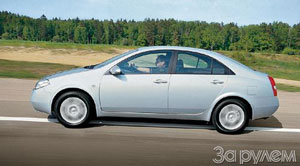
The owners of Volkswagenov, Mercedes, and just passers -by carefully examined our pair. Perhaps, an example was more successful: near it they were more often slowed down, carefully studied. It is clearly more favorable to her and the weak half, immediately endowed Nissan with estimates with a pretty, comfortable, and once with an automatic transmission, then also comfortable.
The strong half is more pragmatic. Giving tribute to the originality of the forms, she carefully examines the interiors and trunk, is interested in engines and equipment. There is already a calculation here. And with it the chances of the lagoon grow: in comparable trim levels it is a little cheaper.
To find out the opinion of others is only part of our task: it's time and on the way. Frankly, the sled program has somewhat cooled emotions. Both cars are not perfect, and we could not accept some innovations as violently as design.
Renault Laguna
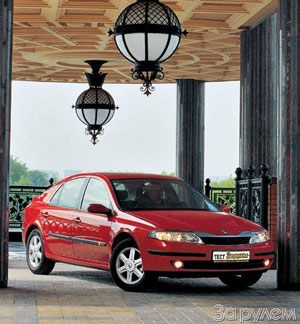 One of the brightest elements of the original style is the key -card that unlocks and revives the car. We put it in a slot on the central console - the scales of the devices come to life, displays displays flashes, slightly shudders of the steering wheel freed from the electromagnetic anti -theft lock. Next, press the starter start -stop - and on the road. But be careful. When the transmission is turned on, the starter will not respond to your team until you squeeze the clutch or transfer the box lever into a neutral position. The rest is more familiar and traditional.
One of the brightest elements of the original style is the key -card that unlocks and revives the car. We put it in a slot on the central console - the scales of the devices come to life, displays displays flashes, slightly shudders of the steering wheel freed from the electromagnetic anti -theft lock. Next, press the starter start -stop - and on the road. But be careful. When the transmission is turned on, the starter will not respond to your team until you squeeze the clutch or transfer the box lever into a neutral position. The rest is more familiar and traditional. Gray shades of the interior, spacious, without pronounced lateral fixation, soft seats, sheathed with skin of a steering wheel, many pockets for storing trifles. Even with a very fluent acquaintance, this car is captivated by space and an abundance of adjustments. In the back seat is cozy and free, but the stylishly falling roof still slightly presses on the head. But we are primarily drivers - therefore, we study the workplace in more detail.
Having appreciated the variety of free landing at the wheel of the lagoon, you gradually come to the conclusion: with such a dynamic appearance I would like a more clear and rigid fixation. Some softenness slightly irritates, as, indeed, a uninformative lever of the gearbox or a speedometer overloaded with numbers.
The first attempt to move almost ended in Fiasco. The engine almost inaudible at the idle speed turned out to be sluggish and poorly adapted for driving. Give him momentum, and work with a long -term clutch at the same time more careful. Without hesitation, they accepted these conditions, but suddenly it turned out that for a temperamental driving, the motor was not very good. No, he, of course, tries to show character after 3000 rpm, but the stretched gear ratio of the transmission and large 16-inch wheels again cool the ardor with a rather sluggish acceleration. The dynamics that the appearance hints at, in fact, turned out to be ordinary, if not modest. Well, let's leave sports ambitions for a more powerful version of the car, paying tribute to comfort.
 Here is the lagoon on top. Soft long -speed pendants perfectly cope with most road bumps, immersing your body into the bliss of smooth swaying. Hydillia does not violate the noise of the tires or the sound of the engine.
Here is the lagoon on top. Soft long -speed pendants perfectly cope with most road bumps, immersing your body into the bliss of smooth swaying. Hydillia does not violate the noise of the tires or the sound of the engine. Outside the city, the situation is somewhat changing. With the speed of speed, the softness of the suspensions gives rise to excessive taping of the body on gentle waves. And everything would be fine, but the handling of the Frenchman, apparently, is configured for more stringent, European characteristics of springs and shock absorbers. And we are faced with a certain inconsistency of the imposition of movements up and down and quite impulsive, with character, the responses of the machine. As a result, in the rapid turns, the lagoon is actively screwed inside, often provoking even the skid of the rear axle, but at the same time scares the driver with unpleasant body fluctuations, which bring confusion into the control process. Again, a discrepancy is obtained.
In general, not everything is perfect in this car, although in separate nominations it deserves praise.
Nissan premer
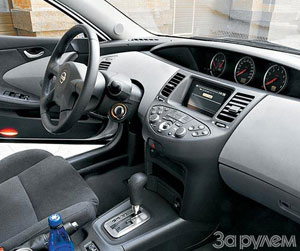 The most spectacular element of the interior is the central console with a multifunction remote control and a combination of devices located in the center of the front panel. You adapt to the latter quite quickly, but with computer control, the car systems have to be pretty tanned. We were not too lazy - we specially put behind the wheel of different people, including experts in computer technology. Alas, no one liked the idea. To play buttons, standing in place, most seemed quite interesting and unusual, but even elementary operations in the movement - say, the choice of fan speed or direction of air flows - turned out to be difficult. The driver was distracted from the road, risking to get into an emergency. I do not want to be known as the enemy of the new, but, in my opinion, so far the three familiar twists or a set of toggle switches are much more convenient.
The most spectacular element of the interior is the central console with a multifunction remote control and a combination of devices located in the center of the front panel. You adapt to the latter quite quickly, but with computer control, the car systems have to be pretty tanned. We were not too lazy - we specially put behind the wheel of different people, including experts in computer technology. Alas, no one liked the idea. To play buttons, standing in place, most seemed quite interesting and unusual, but even elementary operations in the movement - say, the choice of fan speed or direction of air flows - turned out to be difficult. The driver was distracted from the road, risking to get into an emergency. I do not want to be known as the enemy of the new, but, in my opinion, so far the three familiar twists or a set of toggle switches are much more convenient. The monitor screen, which, in general, displays secondary information, looms with a bright spot under the scale of the main devices, distracting the attention of the driver. Another feature of this small TV appeared. Barely opening the door on the flowering lawn, we immediately saw the results of this flowering on the screen: it, like a magnet, collected all the pollen. As you can see, the innovation can cause many emotions.
Relief front seats examples reliably fix you in your arms. There is no imposition of the working pose inherent in the lagoon, but a more strict landing has a better feeling of the car, and the abundance of adjustments and the breadth of their ranges eventually allow you to sit down, as you want. Subjectively, an example is a little closer in height, but otherwise it is just as free and spacious. Well - let's go! The variator lever in the D - Drive position, leg - on the accelerator, and Nissan quite energetically breaks off. At first, it is very similar to the usual automatic transmission. However, as you get used to it, you begin to notice a stranded transition to the highest gears, accompanied only by a change in the sound of the engine, the absence of a kik-down mode and the ability to slow down when the gas is discharged.
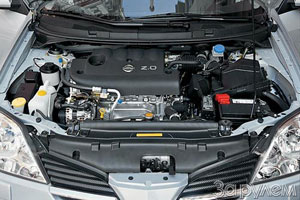 The acceleration process here is as follows. When you press the accelerator, the engine immediately goes to the moment of maximum torque for intense acceleration of the car at the initial stage. If, according to the electronics, this is not enough, the tachometer arrow immediately jumps to maximum power and remains there almost until the maximum speed is reached.
The acceleration process here is as follows. When you press the accelerator, the engine immediately goes to the moment of maximum torque for intense acceleration of the car at the initial stage. If, according to the electronics, this is not enough, the tachometer arrow immediately jumps to maximum power and remains there almost until the maximum speed is reached. You yourself understand how kind and bored in such modes the noise of the motor is. If you do not press the gas pedal too much, you can ride very comfortable and at the same time quite quickly. The painful motor confidently disperses the car, allowing both to rebuild and overtake, even if the tachometer arrow does not rise above 3500-4000 rpm. Honestly, in calm modes Nissan is more convenient for a few wayward lagoon. In addition, the Frenchwoman Nissan contrasts excellent informativeness too soft.
A different character is also laid down in the work of pendants. More stringent and short -handed, they repeat the profile of the road in sufficient detail, not indulging in lulling comfort. However, the inconvenience of shaking is compensated by convenient controllability, which does not present any surprises. As a result, an example, not claiming drivers, in other situations is much easier than the lagoon. Of course, this car is not perfect, but its character is closer and more understandable.
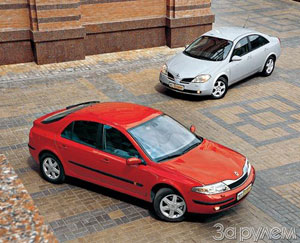 PHOTO FOR MEMORY
PHOTO FOR MEMORY As you know, the image is negative and positive. And if our first is associated with shortcomings, then the second, on the contrary, reflects the best. I think both cars passed the exam in our test photo studio, although they had a lot of both qualities. The main thing is the feeling of novelty remaining after meeting them.
Stylish appearance; spacious salon; high level of equipment; good smoothness; Lack of noise.
Insufficiently burdensome engine; fuzzy work of the gearbox; Non -optimal adjustment of suspensions.
Original external data; non -standard internal equipment; Convenient combination of most sled characteristics.
A complex climate control system management algorithm, a route computer and an audio system; noisy engine; vibrations.
The editors thanks
Major Auto Firm for the cars provided. Detailed information - in the section of dealers.
The editors thanks
Complex Scarlet Sails for help in organizing photographs.
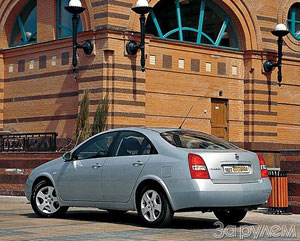
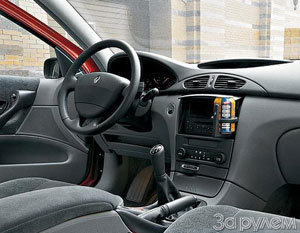
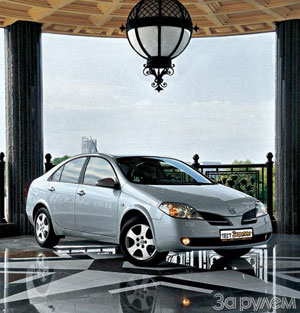






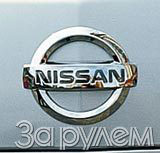
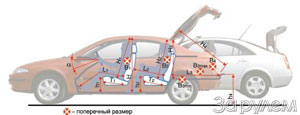

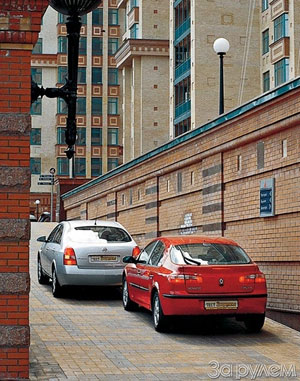
Sergey Voskresensky
Photo: George Sadkov
Source: The magazine "Driving"
Video Crash tests Renault Laguna 2001 - 2005
Test drive by Renault Laguna 2001 - 2005
Renault Laguna 2001 Krash Test - 2005
Krassh Test: Detailed Information34%
Driver and passengers
12%
Pedestrians







